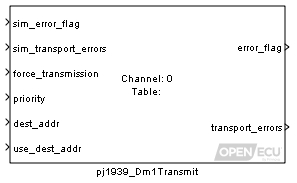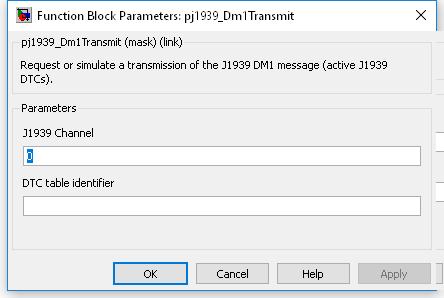Transmit a J1939-73 DM1 message containing the DTCs with an active state from a DTC table.
None (Main library). (See Section 2.3, “Licensed Features”.)

A J1939-73 DM1 message is a variable length message, transmitted by a network node to the global network address. The DM1 message contents detail any active diagnostic trouble codes. As the message is variable in length, direct blockset support is provided (rather than relying on the pj1939_PgTransmit block).
When the block iterates, the DTC table is inspected for active and previously active DTCs. If any differ since the last time the block iterated, a DM1 message could be sent. The J1939-73 specification explains how the periodic transmission of this message varies in relation to DTC activation state changes, as a need to limit J1939 network bandwidth.
Excerpt from J1939/73 specification, on transmission rate:
A DM1 message shall be transmitted, regardless of the presence or absence of any DTC, once every second and on state change. To prevent a high message rate due to intermittent faults that have a very high frequency, it is recommended that no more than one state change per DTC per second be transmitted. For example, if a fault has been active for 1 second or longer, and then becomes inactive, a DM1 message shall be transmitted to reflect this state change. If a different DTC changes state within the 1 second update period, a new DM1 message is transmitted to reflect this new DTC.
The simulation inport for the error_flag outport.
Value type: Boolean Calibratable: No Simulation value of the outport transport_errors.
Value type: Integer Calibratable: No Set to 1 to force the transmission of a DM1 message, set to zero otherwise.
Range: 0 or 1.
Value type: Boolean Calibratable: No J1939 priority of the DM1 message to be transmitted.
Range: [0, 7]
Value type: Integer Calibratable: No J1939 destination address for the DM1 message (This could be the source address of the corresponding PGN request, or the global address (255) if the request was sent to the global address). If use_dest_addr is false or a PDU2 message is shorter than 9 bytes, this value is ignored and the message is sent to the global address.
Range: [0, 255]
Value type: Integer Calibratable: No Whether to send the DM1 to a specified destination address. If false (0), the message will always be sent to the global address. Set to true (1) to allow the message to be sent to a specific destination address, such as the source address of a PGN request.
Range: 0 or 1.
Value type: Boolean Calibratable: No
Set to 1 when the DM1 message could not be buffered for transmission, or if a previous request to send a DM1 message has not completed.
Value type: Boolean Calibratable: No Saturated count of transport errors (timeout or aborts) for this message.
Range: [0, 255]
Value type: Integer Calibratable: No

The logical J1939 channel on which to transmit. Must be a channel declared with a pj1939_ChannelConfiguration block.
Value type: Integer Calibratable: No The name of the DTC table to act on (there must be a corresponding named table specified in a pdtc_Table block in the model).
Value type: String Calibratable: No